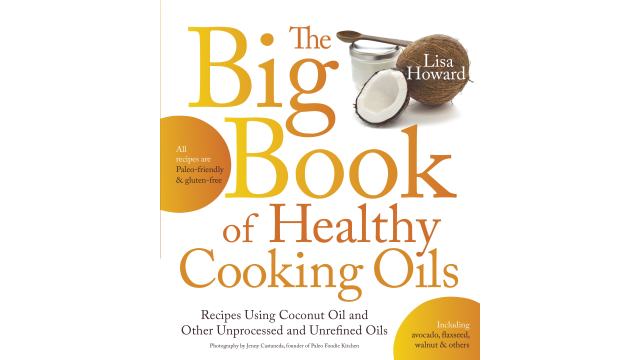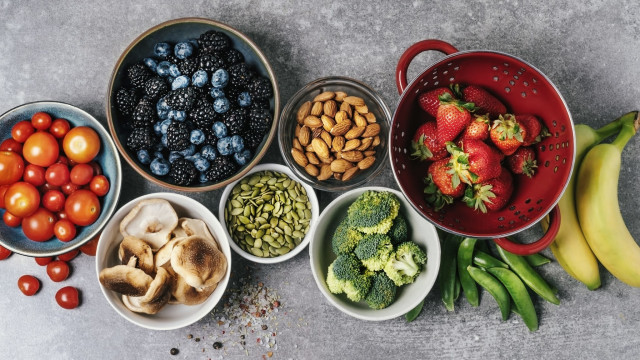Q&A with Lisa Howard

Lisa Howard prefers to call herself as “qualitarian.” The Detroit-based cooking instructor, culinary speaker, and cookbook author says that she will go the extra mile to find the finest ingredients for her meals. If good quality is her eating philosophy, “health, affordability, and flair” remain her basic principles while developing recipes.
Howard’s focus on health led to her writing two books that speak to contemporary concerns around cooking and food. The first was Healthier Gluten-Free and for her second book, The Big Book of Healthy Cooking Oils, she took on the contentious issue of oils and fats. The book of tasty recipes is also a primer on navigating the many food trends and theories around oils and fats. Besides recipes from across the globe, Howard offers practical hacks and tips to pick the right oils to add flavor and good health to your next dish.
When she’s not working on the next healthy recipe or practicing the steps for her next salsa routine, you can find Howard scouring farmers’ markets for fresh, seasonal produce and interesting and unusual ingredients for her next meal.
Roundglass Food: What’s the one reigning myth about fats and oil you would like to clear?
Lisa Howard: A lot of people don't realize that vitamins A, D, E and K are fat-soluble, meaning that we need to consume fat with foods rich in those vitamins in order to be able to access those vitamins. Choosing an unrefined, omega-3-rich oil like walnut or flaxseed is a great way to tap into the nutrition of many foods! Also, something else that many people don't realize is that all unrefined oils aside from avocado are flavorful--if an oil is "neutral," then it's almost certainly what the oilseed industry refers to as an RBD oil: refined, bleached, and deodorized.
RG: What’s a healthy fact about ghee or clarified butter you’d like to highlight?
LH: I love the fact that ghee can handle extremely high heat! Its high saturated fat content means it's stable and won't break down when heated. (Or splatter and make a mess.) On top of that, ghee tastes incredibly luscious. It's ideal for high-heat cooking, although I often use ghee for medium heat simply because it imparts so much flavor to foods. Plus, then I don't have to worry about leaving the ghee on the heat for too long or accidentally turning it up too high!
RG: What are your go-to oils for healthy cooking and why?
LH: My first consideration for choosing a cooking oil is what temperature do I want to use: high, medium, or low? If I'll be cooking on high, I choose an oil/fat that's primarily saturated (ghee, butter, coconut oil, etc.), and if I'll be cooking on medium or low, I choose one that's primarily saturated or monounsaturated (olive oil, avocado oil, nut oils aside from walnut, etc.). Polyunsaturated oils (walnut oil, chia seed oil, flaxseed oil, pumpkin seed oil, etc.) shouldn't be heated, so I would choose those for non-heated uses, like salad dressings, finishing drizzles, and dips. In the US, all oils clearly display how much saturated, monounsaturated, and polyunsaturated fats each oil contains, making it easy to see what kind of oil it primarily is.
Past the temperature consideration, I would think about flavor. Unrefined oils are all very flavorful except for avocado (avocados themselves are not very flavorful; they're creamier than anything else), so I would think about whether I wanted a rich and buttery flavor like ghee, a nutty flavor like pistachio, or a grassy and piercing flavor like olive oil or flaxseed oil. (Note that palm oil is also saturated and suitable for high-heat cooking, but due to environmental concerns, I don't recommend palm oil unless it's certified as being sustainably grown.)
RG: How much do fats and oils contribute to making food unhealthy? Most street foods across the world and fast food are deep fried and have high levels of oils and fats.
LH: The main problem with fats is that they can be rendered rancid, either through the initial processing done by manufacturers or by inappropriate use/reuse. Polyunsaturated oils should never be heated, monounsaturated oils can only tolerate medium heat (and shouldn't be reused), and although saturated fats can handle high heat and some reuse, it's nearly impossible to know whether or not street foods/restaurant foods have been fried in oil that has been reused too often or not. It's also nearly impossible to know whether unsaturated fats have been inappropriately used for deep frying. Rancid oils cause a myriad of health problems, including inflammation issues that underlie many chronic conditions.
RG: Is it right to say the story of processed and hydrogenated oils are significantly related to the large commercialization of food?
LH: Yes. RBD oils — refined, bleached, and deodorized — are the cornerstone of many large-scale commercial foods, from chips to baked goods.
RH: What do you recommend we check on a label to determine the presence of healthy fats and oils in a food packet?
LH: In the US, all oils clearly display how much saturated, monounsaturated, and polyunsaturated fats each oil contains, making it easy to see what kind of oil it primarily is. Saturated fat can handle high heat; monounsaturated oil can handle medium, low, or no heat; polyunsaturated oil should not be heated. That knowledge allows consumers to use oils properly. However, it's difficult to know whether or not the oil in the container is refined or unrefined. Very few regulations apply to any type of oil, and olive oil and avocado oil, in particular, have been shown to be adulterated or mislabeled (i.e., calling an olive oil extra-virgin when it doesn't meet the international regulations for what constitutes an extra-virgin oil). There is no single authority that oversees oils in the US.
That said, the UC Davis Olive Center does have useful information for consumers as well as a standardized certification that companies can apply to receive if their products meet the specifications. One clue as to whether an oil is refined or unrefined is the flavor. Does it taste like what it is? Unrefined walnut oil tastes like walnuts. Unrefined almond oil tastes like almonds. Unrefined pistachio oil tastes like pistachios. Their aromas match their flavors.
Another clue is the quality of the container. Is it cheap, clear plastic or opaque or tinted glass? While the container isn't a guarantee of quality, that observation plus the flavor/no flavor and aroma/no aroma of the oil plus some research into individual companies can be helpful.
RG: Oil wars are prevalent in the food and nutritional space too. How do we make informed choices?
LH: I advise paying attention to the lipid profile of each oil (saturated, monounsaturated, polyunsaturated) and storing and using it accordingly in order to avoid consuming rancid fats.
RG: Why is the search for the next super oil ruling nutrition space?
LH: In my opinion, this comes down to food companies finding The Next Big Thing and profiting from it. Buzz is created and food magazines start heavily writing about a particular oil/featuring recipes with it and publishers start publishing cookbooks with a matching focus.
RG: What is your favorite season for cooking and why?
LH: I enjoy all seasons because I think it's fun to choose seasonal ingredients and to cook with the overall mood of the season in mind. Winter is a great time for cozy stews, spring is perfect for super-fresh salads, summer is a great time to showcase ripe fruits in desserts, autumn is prime squash time. (And you can do pretty much anything with squashes.)
RG: Do you have any nutrition concerns — what’s your main concern, and how do you address it?
LH: I'm a big fan of consuming less sugar and less refined versions of sugar. I typically cut the amount of sugar called for by half or more, and I also use natural sweeteners like maple syrup and sucanat/jaggery rather than refined white sugar.
RG: How is food a part of your own wellness practice?
LH: Food is the foundation of good health. It's also important to sleep well, exercise every day, manage stress, and foster strong relationships/connections. But I think it all starts with food!
Key Takeaways
- Fats are necessary for good health.
- Cooking temperatures and methods impact nutrition.
- Choose natural over refined fats and oils.


